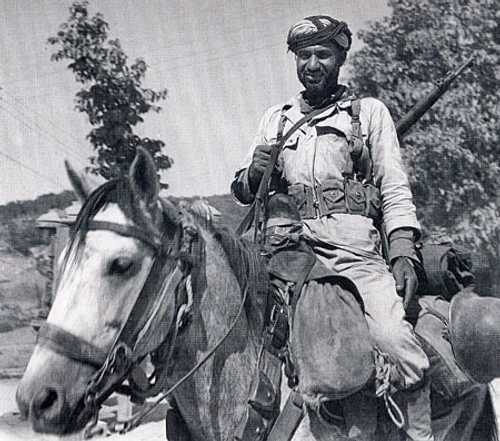
French Forces
Moroccan Goumier in Italy.
Government of France (?)
A French/Moorish "Goumier", complete with turban and (in this case) horse, in Italy, 1944. The Goumier are, perhaps, the most controversial force on the Allied side in WW2. Even their status is somewhat doubtful - were they "mercenaries", or "irregulars", or "auxiliaries", or "French troops" ? The best answer, as far as I can determine, is that they were French troops, but had elements of the mercenary in the sense that they tended to serve on very specific contracts of employment, and were (theoretically) subject to the King of Morocco (even many of them actually came from non-Moroccan parts of French North Africa). Their favoured tactics were certainly somewhat "irregular". One point that is, at most, slightly contested is that the French Goumiers were a very effective fighting force, particularly in mountain combat (even when serving in types of mountain terrain very dissimilar to that of the Atlas Mountains). This capacity was recognized, not only by French, but by US and British commanders from North Africa, through Sicily and Italy, and all the way through the South of France and western Germany. The controversial matter concerns the very common accusation against the "Moors" of war crimes, mainly in Italy (notably following the Battle of Monte Cassino and, subsequently, in Tuscany and Lombardy). The truth of these accusations is difficult to assess, not least because the number of actual prosecutions, not only of "Moors", but of Allied soldiers in general, for acts of plunder, murder, rape etc. seem surprisingly low, by reference to the anecdotal evidence. Also, it would appear that a substantial number of "Moors" were "executed" without benefit of trial for alleged offences of this sort, disproportionately high by any known indication of similar "solutions" being applied to other Allied soldiers. It is only honest to say that all armies, all the way back to the Pharoah Narmer 5,000-odd years ago, and indeed before, have indulged themselves in acts of rapine in war when given the opportunity. It is also true that objective evidence of this sort of activity is particularly difficult to obtain, as such evidence as is available is often supplied by winners, who will maximize the atrocities committed by their opponents and minimize (or expunge) those committed by soldiers on their own side. We are usually left with anecdotal evidence (often very substantial) but of poor quality, and subject to significant cultural, sociological and anthropological baggage. In the case of the "French Moors" in Italy, the baggage is considerable. It included atrocity propaganda against Africans dating from the First and Second Italo-Abyssinian Wars; Italian racist rape-scare propaganda against Africans (German-influenced and otherwise); German racist rape-scare propaganda directed against Africans; and even (for the benefit of the socioligists and anthropoligists among us) anti-"Moor" communal history/traditions dating back to the Medieval and Early Modern periods. The truth as to whether France's "Moors" were more (or much more) inclined towards rapine than other soldieres will in all probability never be known - even approximately. The general issue of "victor's" war crimes is, however, one that requires much greater attention from historians - and not just in relation to the "Moors". Racial and other prejudices, against North Africans and others, and systematic prejudices in favour of "victors" and against "enemies" current and subsequent, have certainly distorted the sources. If we are to arrive at a (reasonably balanced and sound) understanding of the "Moorish question" as well as parallel issues relating to other armies, we will really, seriously, need to commit ourselves to "historical objectivity" - at least, as far as it may be possible to do so. Best regards, JR.
7542 Views
5/27/2014
